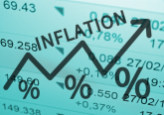
The World Bank recommends that the Moldovan authorities review the mechanisms for granting VAT exemptions and benefits, as well as adjust the VAT rate system.
In a new World Bank study “Public Finance Analysis. Sustainability and Growth-Driven Tax Policy, which was presented at the Economic Press Club on Tuesday, noted that the VAT exemptions being granted severely reduce the tax base and undermine tax collection efforts. Economists emphasize that Moldova could receive 17 billion lei more (which is about 7% of GDP) if the standard VAT rate were established in the legislation, and all benefits and reduced rates were cancelled. The analysis carried out identified opportunities for VAT reform with the potential to increase tax collections, primarily for reduced VAT rates in the agricultural sector and in the transport sector. For example, the reduced rate of 8% applied to the agricultural sector does not apply to the food industry, which operates at a standard rate of 20% and cannot deduct VAT. Additional problems with VAT collection are related to the structure of the consumer basket. Given the composition of the consumer basket and the availability of exemptions from VAT for some goods, the effective VAT rate for households as a whole is lower. The weighted average VAT rate for households is 9.4%, which is significantly lower than in EU countries. The WB analysis notes that in the current economic context, the only viable option in the short term would be rationalization/optimization of budget spending while protecting the poor and most vulnerable. WB economists have modeled two scenarios: in the first, they propose to increase the VAT rate on food and non-alcoholic beverages to 20%, while maintaining the remaining VAT rates at the current level; the second scenario involves the introduction of VAT at a rate of 4% for all goods that are currently exempt from VAT. In the first case, according to WB calculations, we can expect a moderate decline in the welfare of the population and an increase in government revenues (+0.5% of GDP), as well as an increase in the poverty rate by 1.7 percentage points. Under the second scenario, the decline in final household incomes will be less pronounced, incomes will grow more moderately (+ 0.2% of GDP), and poverty will increase by 1.4 percentage points. At the same time, in the medium term, it is possible that VAT rates will approach the level established in the EU. In this context, two scenarios were also considered: increasing the VAT rate to 20% for all goods and services and maintaining goods and services with a zero VAT rate and exempt from taxation, and increasing the VAT rate on food and non-food products and services to 15%. In the first case, pensioners and households with several adults and no children will suffer the most, with final incomes falling by 2.2% and 1.7%, respectively. In both scenarios, the poverty level will increase by 2.2 p.p. at a general VAT rate of 20% and by 1.9 p.p. if the reduced VAT is 15%. Both scenarios will bring significant revenues to the budget from indirect taxes: by 0.8% of GDP in 2019 - under the first scenario and, accordingly, by 0.4% of GDP - under the second scenario. Herewith, WB economists emphasize that the optimization of VAT-related fiscal spending should be carried out in parallel with the development of mechanisms to mitigate the negative impact on the poorest segments of the population, since the costs of food, non-alcoholic beverages and housing and communal services are especially high for the poorest 40% population. “As a first step, the authorities could rationalize VAT spending, which is not in line with EU directives. In the long term, changes in the VAT rate system are justified and may be accompanied by a general process of convergence with the EU,” the WB analysis says. The simulation does not take into account spillovers that could affect the economy and therefore the fees and impact on poverty, nor any mitigation measures through social protection programs that could be implemented. // 13.06.2023 — InfoMarket







